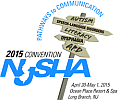Perspectives of School-Wide Implementation of Social Thinking
Thursday, 11:00am to 1:00pm
Seabright
Poster 1
Direct instruction of social skills in the classroom is an integral component for success for students with disabilities. A review of the literature in this area demonstrates the need for information concerning implementation of social learning programs. Social Thinking curricula have been implemented in elementary schools as an instructional method for teaching social cognition. The purpose of this study is to examine the social validity of two Social Thinking programs: Think Social! A Social Thinking Curriculum for School-Age Students (Winner, 2006) and Superflex: A Social Thinking Curriculum Package (Winner, 2008). Specifically, research questions addressed which social skills are being taught in schools where these programs are implemented, which other programs are used in conjunction with the Social Thinking curricula, and how elementary school teachers feel about the goals, procedures and outcomes produced by these programs. Teachers and specialists in elementary schools where a Social Thinking curriculum has been implemented school-wide were surveyed. Respondents reported directly teaching a number of social skills in the classroom and utilizing various methods to assist in teaching these skills. Lastly, this study revealed positive attitudes toward these two Social Thinking programs. Respondents agreed with the goals, procedures, and outcomes of these two interventions.
Track:
Pediatric
